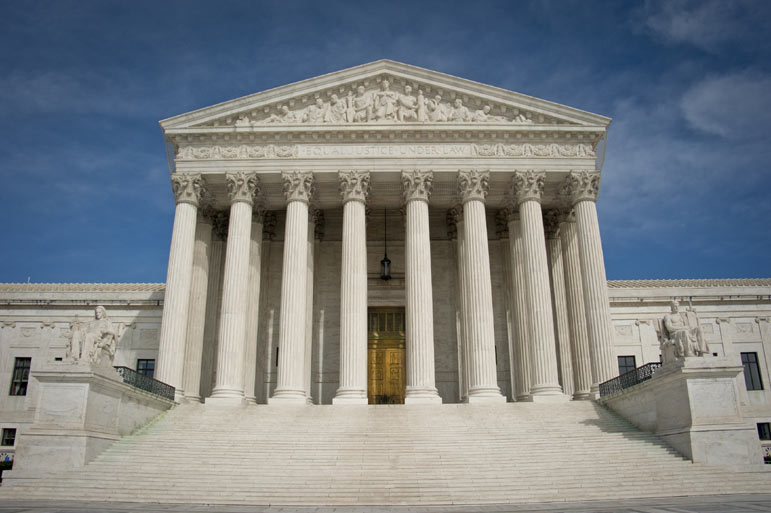
Senate Judiciary Committee member Ben Sasse recently wrote in the Wall Street Journal that the Constitution "doesn't talk about Democratic or Republican judges," and that "viewing the Supreme Court through a partisan lens undermines the nature of the institution." While the Nebraska Republican's heart is in the right place, his argument misses the crux of the fight over the Supreme Court nomination that will soon roil his committee. At the core of our political disagreement today is whether Americans are to be governed by the Constitution written by the Founding Fathers or by a Supreme Court acting as a permanent constitutional convention, making up the law as it goes along. Choosing a justice who subscribes to one or the other of these views is thus as intensely political a decision as we can make.
Woodrow Wilson most clearly articulated this choice. He dismissed the Constitution as a relic of a bygone age of wigs and knee-breeches, suitable enough for the uncomplicated eighteenth century, but now, with its clunky checks and balances, an intolerable impediment to efficient government. The modern era is too complex for self-government by ordinary citizens, as the Founders supposed possible. It requires a much bigger, more active, more powerful government than they conceived-government by highly educated, specially skilled experts, scientifically and disinterestedly administering public matters in the public interest. And the changed times that call for so changed a government also call for "living political constitutions [that] must be Darwinian in structure and practice," allowing modern government to adapt promptly to changing twentieth-century conditions by means of "more liberal, not to say more lax" Supreme Court decisions, made with "boldness and a touch of audacity," the professor-president declared. After all, wasn't it right, both practically and morally, to be "progressive?"
It was only when Franklin Roosevelt entered the White House that Americans saw just what kind of audacity Wilson had in mind. When FDR kept trying to create executive-branch agencies that would control vast swaths of U.S. economic activity, the Supreme Court kept blocking him, ruling that the Constitution's Commerce Clause gave the federal government power to regulate interstate commerce, but not commerce within a single state.
Every time FDR's lawyers trotted out a new, sophistical argument as to why, for instance, a strike at a single plant in a single state would jeopardize an entire national industry and perhaps the whole U.S. economy, as the flap of a butterfly's wings in Japan is said to affect the weather in America, the justices swatted them down. But when FDR threatened to circumscribe the Court's power and to pack it with left-wing judges, the nine justices folded, allowing the president to set up the vast panoply of New Deal agencies with authority to make rules like a legislature, adjudicate supposed infractions of them like a judge, get private papers and inspect private premises without a judicial warrant, and assess penalties without either a grand or a petit jury to protect the citizen. And the self-gelded Supreme Court allowed this trampling of the Bill of Rights's protection of the individual and the Constitution's separation of powers-powers that could not legally be delegated to any gimcrack "agency"-without a peep.
FDR recognized, with characteristic insouciance, that he had erected "a 'fourth branch' of Government for which there is no sanction in the Constitution." From that day to this, the unconstitutional Administrative State has swollen in size and power. It is only recently, when such bodies as the Environmental Protection Agency or the Securities and Exchange Commission or the Federal Communications Commission have made rules that glaringly have no basis in the consent of the governed and look like raw tyranny, that conservatives and civil libertarians have cried foul.
The burning political question of our day is whether we are to return to something like the limited government of enumerated powers, circumscribed by checks and balances, that the Founders created-as conservatives and civil libertarians want-or whether we will continue to be governed by administrative agencies legitimized by Woodrow Wilson's "living" Constitution, which is continually made and remade by unelected judges guided by their own prejudices, as our "wise Latina" Supreme Court justice Sonia Sotomayor essentially admitted.
"Progressives"-as those on the left like to call themselves by way of self-congratulation-worship the Administrative State. They cling to it by citing decades' worth of Supreme Court decisions upholding it. They cite the doctrine of stare decisis: that justices must respect earlier Supreme Court rulings, which have the status of settled law, just like Griswold v. Connecticut, a 1965 decision claiming a right to privacy derived from "emanations, formed by penumbras" from the Bill of Rights. The stare decisis doctrine is the reason why the justices in the 1954 Brown v. Board school-desegregation case didn't rule that the Fourteenth Amendment prohibits discrimination by race, period. To have ruled thus would have overturned the Court's 1896 Plessy v. Ferguson decision, which declared that separate accommodation of the races was legal, so long as those separate accommodations were equal. So the Brown Court twisted itself like a pretzel, using far-fetched psychological testimony that, in the specific case of education, separate could never be equal.
In truth, however, America really has no constitutional law in the sense that England has, with its unwritten constitution made up of nothing but the accumulated rulings of its judges from Lords Coke and Camden on down. All we have, as Justice Clarence Thomas rightly likes to say, is the Constitution itself, trailing two centuries of Supreme Court interpretations that deserve respectful consideration, but that might be wrong. And just as it would be perfectly reasonable for a Supreme Court to say, "Our late honorable brethren were wrong in their interpretation of the Constitution in Plessy v. Ferguson," so it would be reasonable to overturn decisions on which the Administrative State rests, such as the wacky 1942 Wickard v. Filburn decision, which held that a farmer's production of grain to feed to his own cows was subject to federal regulation under the Commerce Clause.
What's at stake in the confirmation of new Supreme Court justices is therefore as momentously political as the 1787 Constitutional Convention: are we to be a self-governing republic, or are we to be ruled by arbitrary, unelected bureaucrats, who think themselves wiser than we, the people of the United States?
Myron Magnet, is an editor-at-large at City Journal, where this first appeared, and its editor from 1994 through 2006. He is a recipient of the National Humanities Medal. His latest book is The Founders at Home.
Previously:
• 08/01/16: The Siberian Candidate: Do the Dems and the New York Times seem a bit paranoid?


 Contact The Editor
Contact The Editor
 Articles By This Author
Articles By This Author